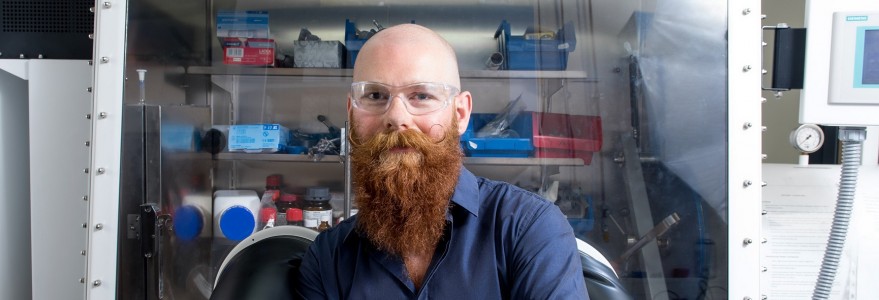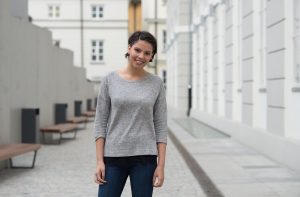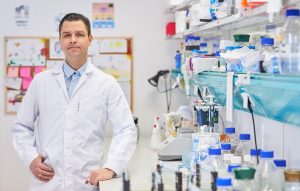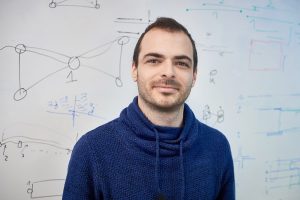“Our research group is in a fortunate position. We have got some fantastic state-of-the-art apparatus. My impression is that there is a lot of progress right now at the University of Warsaw. This is another reason why I think it is a great opportunity to be here,” says Dr. Phillip Iain Jolly from UK, a postdoc at the UW Biological and Chemical Research Centre.
He is a chemist. He did his Ph.D. at the University of Strathclyde in Glasgow where he carried out a research on super-electron-donors. Then he worked as a postdoctoral researcher for British pharmaceutical company, GlaxoSmithKline before moving to Heidelberg. In Germany he did another postdoc at the prestigious Catalysis Research Laboratory (CaRLa) which is a collaboration between University of Heidelberg and BASF.
I missed the research
“After this I did some non-scientific work. It was intervention work with young people in crisis situations. It was a good break, extremely rewarding and it gave me time to reflect. However, I missed the research and then I saw that Professor Grela had a position open to join his group as a postdoc. I was interested in catalysis, particularly olefin metathesis and Professor Grela is an expert in this topic so I applied. I did not know him personally but I was familiar with his research,” Dr. Jolly explains his reasons to choose Warsaw.
Professor Karol Grela is the head of the Laboratory of Organometallic Synthesis. He specialises in organic chemistry and has been concentrating on designing catalysts of various chemical reactions for many years. Catalysts can accelerate industrial production, making it more economical and environmentally friendly. The core of his group is Polish, but – apart from Dr. Jolly – there are also postdocs from India, Ph.D. students from Germany and Master’s students from South Africa.
Professor Grela’s research group is a part of the Biological and Chemical Research Centre – one of the newest units at the University of Warsaw. Over the last decade, thanks to EU funding, two interdisciplinary centres have been built on the Ochota campus: the Biological and Chemical Research Centre and the Centre of New Technologies. Representatives of the exact and natural sciences have been equipped with laboratories facilitating research at the highest level. Dr. Jolly admits that across the country there is still a bit of disparity in the equipment among the Polish research teams. But he adds that there is a huge progress in this field. His research group has access to the high tech instrumentation necessary to conduct research at an international level in his discipline.
Good news
He came to Poland to join the team of Professor Grela in February 2016. A few months later the National Science Centre (a government agency supporting research in Poland) opened a call for international researchers. The POLONEZ programme enables them to apply for fellowships to conduct their own research in Polish host institutions. Dr. Jolly submitted an application for a fellowship to collaborate with Professor Grela and in November 2016 he received good news. From among 319 submitted proposals 26 have been approved for funding. He was one of the winners and received a two-year grant for his project Novel ruthenium alkylidene complexes incorporating bidentate ligands: Exploration of reactivity, stability and stereoselectivity in olefin metathesis*. The results of which can have implications for the development of future pharmaceuticals, modern materials and fuels.
“My POLONEZ grant finishes in February 2019. I certainly plan to stay in Warsaw. I would like to start my own research group here. There are some good opportunities at the moment”, says Dr. Jolly. He wants to get back to working with the students. “Although I supervise in the laboratory, I don’t lecture right now but that is something which I am looking forward in the near future. There might be a possibility that I can do this at the University of Warsaw. The first time I mentored students was during my Ph.D. It was a great experience,” he stresses. He has open position for an undergraduate student at the moment.
I like the freedom of academia
The Laboratory of Organometallic Synthesis carries out applied research whose results have practical applications. The team works with numerous companies in Poland and abroad. “Working with the industry is definitely something what I am interested in. Doing basic research is rewarding, but doing something that you can apply to everyday challenges is really valuable, particularly if you are able to make some contribution to society”, explains Dr. Jolly. But on the other hand he underlines that he prefers to stay in academia rather than go into industry. ”I like the freedom to be able to explore the things that I am most interested in. If you work in industry you have got a project and a target you must focus on regardless of whether you find it stimulating. Similarly, you may find some interesting things out along the way, but you are not necessarily able to explore them because they are not aligned with your employers objectives. In academia you have more flexibility. You discover some interesting things which can then open the doors to new exciting research, many great accomplishments began with serendipity.”
Work-life balance
Asked, whether he knew something about Poland before coming to Warsaw, he laughs and says: “I knew it is a country.”
Comparing experiences from his stays abroad he underlines that people in Poland are very open and friendly. “Since I came to Poland I met a lot of people outside of work also, not only my colleagues within the university. Now I have got really good friends here. It is important because – particularly in science – it is difficult to strike the work-life balance. Building friendships and cooperation’s at work is important but if you socialize only with your colleagues outside of work then you tend to start talking about work. Your brain is always switched on. And sometimes you should take time to shut off from challenges, your subconscious can even provide solutions on its own. If nothing else you return refreshed ready to achieve your objectives”.
* This research was funded by “Polonez 2” research grant no. 2016/21/P/ST8/03856 supported by the National Science Centre, Poland. This project has received funding from the European Union’s Horizon 2020 research and innovation programme under the Marie Skłodowska-Curie grant agreement No 665778.







